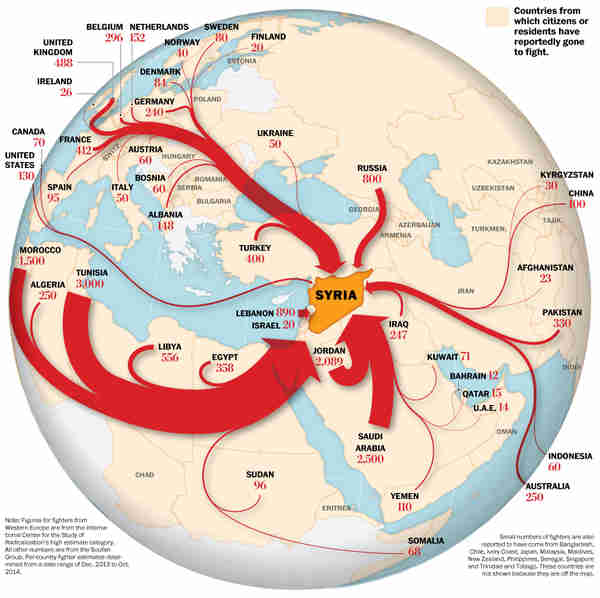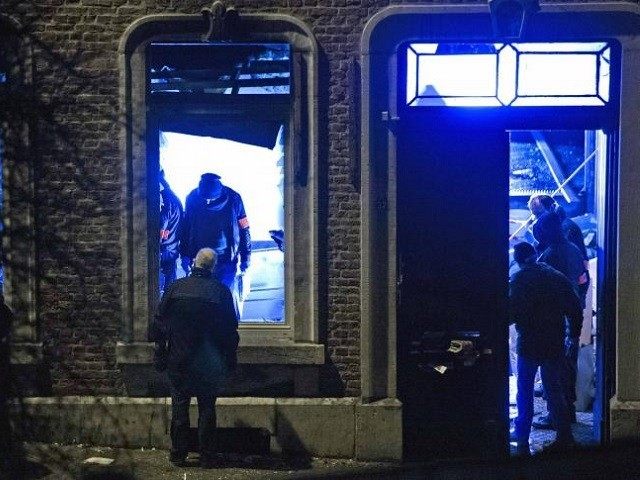This morning’s key headlines from GenerationalDynamics.com
- Belgium police raid multiple groups of returning Syrian jihadists
- The growing problem: Young men return home after ISIS terror training
- Lithuania asks citizens to prepare for Russian invasion
- The Historical Thesaurus of English now available online
Belgium police raid multiple groups of returning Syrian jihadists

Foreign fighters flow to Syria. This graphic is from Oct 2014, so the figures may have doubled by now (WaPost)
Belgium police raided ten locations where it was suspected that home-grown jihadists returning from Syria were planning terror acts. One location was in the town of Verviers, where two suspected terrorists were killed after a shootout, and the others were spread across the capital city Brussels, which is also the capital city of the European Union.
Police believe that the terrorists were planning a “major attack,” although there was no evidence of an imminent threat. The counter-terrorism raids come one week after the Charlie Hebdo terrorist attack in Paris, though it’s not believed that the two are linked. AFP and Bloomberg
The growing problem: Young men return home after ISIS terror training
The Belgium raids highlight a rapidly worsening problem: That disaffected young people from any country can go to Syria and receive terrorist training from the Islamic State of Iraq and Syria (IS or ISIS or ISIL), and then return home and use their newly acquired skills for a terror attack.
I’ve been discussing this issue for almost two years, but the graphic at the top of this article illustrates it beautifully. The actions of Syria’s Shia/Alawite president Bashar al-Assad to conduct a war of extermination against Sunni women and children in his own country, using weapons supplied by war criminal Vladimir Putin, have turned Syria into a magnet for depressed and disaffected young men around the world who think that they’ll find true happiness maiming and killing other people. (The graphic is from October 2014, so the figures may have doubled or tripled by now.)
The most significant development of the last year has been the rise of ISIS in Syria and Iraq, led by the charismatic Abu Omar al-Baghdadi, who is attracting even more would-be jihadists to populate his self-declared caliphate.
The events of the last couple of weeks have seen another major, significant development. The Charlie Hebdo attackers were trained in Yemen by Al-Qaeda in the Arabian Peninsula (AQAP), before ISIS ever gained prominence. In the last few days, AQAP has been crowing about how they were responsible for the Charlie Hebdo attack. The new development is that the leaderships of ISIS and AQAP are apparently now in competition with each to be most fashionable and trendy terror group, so that they’ll attract the most would-be jihadists.
Unfortunately, there’s every sign that these trends are going to accelerate. It takes only a few lone-wolf jihadists, after getting some training in Syria or Yemen, to set off a bomb or launch a gunfire assault, and it’s apparently the desire to both ISIS and AQAP leaders to encourage such attacks. The number of young men willing to go to Syria and Yemen to get terrorist training is growing, and the number of young women going to Syria to marry a terrorist because maiming and slaughter is so erotic is also growing. So the simple math is that there is going to be more of these attacks.
In Belgium on Thursday, the police were able to act before it was too late. It’s doubtful that they’ll always be so lucky. Washington Post (11-Oct-2014)
Lithuania asks citizens to prepare for Russian invasion
For most of the last century, Lithuania was part of the Soviet Union, and only achieved independence in 1991, after which it joined Nato and the European Union. But the recent Russian invasions of Georgia and Ukraine, annexing territory from each, has led Lithuania’s government to issue a manual on “How to Survive a Russian Invasion.”
The main advice is:
Keep a sound mind, don’t panic and don’t lose clear thinking. Gunshots just outside your window are not the end of the world.
In the event of invasion, the manual says Lithuanians should organize themselves through Twitter and Facebook and attempt cyber-attacks against the enemy.
In case of Russian occupation of Lithuania, the manual advises demonstrations and strikes or “at least do your job worse than usual” as resistance techniques. Reuters and Russia Today
The Historical Thesaurus of English now available online
The University of Glasgow Historical Thesaurus of English web site was launched on Thursday. It contains 800,000 words from Old English to the present day, based on the Oxford English Dictionary, arranged into detailed hierarchies within broad conceptual categories such as Thought or Music. According to the university, it is the world’s only complete historical thesaurus published in any language.
193 words for “drunk,” include drink-drowned, jug-bitten, swilled, bumpsy, drunk as wheelbarrow, muckibus, half-shaved, grogged, pickled, swizzled or elephant’s trunk, many from the 1600s.
Instead of “darling,” try: honey, babe, my dove, lamb, mopsy, flitter-mouse, prawn or my ding-dong.
The Historical Thesaurus has been under development since 1965, and some 230 linguists have been involved in the project. Daily Mirror (London) and University of Glasgow Historical Thesaurus of English
KEYS: Generational Dynamics, Belgium, Brussels, Brussels, Verviers, Islamic State / of Iraq and Syria/Sham/the Levant, IS, ISIS, ISIL, Daesh, Yemen, Al-Qaeda in the Arabian Peninsula, AQAP, Syria, Iraq, Bashar al-Assad, Vladimir Putin, France, Paris, Charlie Hebdo, Russia, Lithuania, Georgia, Ukraine, University of Glasgow, Historical Thesaurus of English
Permanent web link to this article
Receive daily World View columns by e-mail

COMMENTS
Please let us know if you're having issues with commenting.